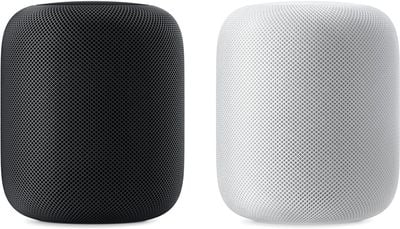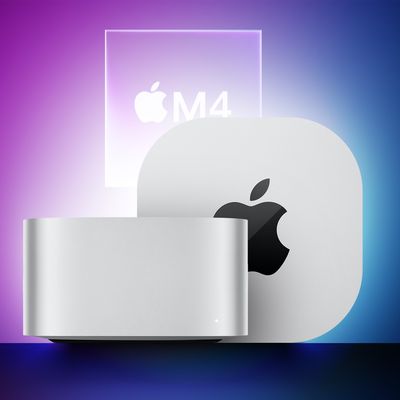macOS Big Sur 11.3 Beta Adds Support for HomePod Stereo Pairs
Apple today released the first beta of an upcoming macOS 11.3 update to developers for testing purposes, and among other features, the new software adds an option to set a pair of stereo-paired HomePods as the default sound output.

In current versions of macOS, HomePods set up as a stereo pair can be used in the Music app or for AirPlay content, but it's necessary to select them manually through the AirPlay interface.
With the macOS Big Sur 11.3 beta, a HomePod stereo pair is displayed as a single option in the sound output list rather than displaying each HomePod as separate as before. Selecting a pair of HomePods as an audio option plays audio in stereo mode by default.
Support for stereo-paired HomePods was first noticed by 9to5Mac, and the site says that the feature is not yet working consistently, so Apple still has some work to do. Using paired HomePods in this way works for music and videos in apps, but system sounds will continue to play on the built-in Mac speakers.
Stereo-paired HomePods can already be set as an audio output option on iPhone, iPad, and Apple TV, so the update brings the same functionality to the Mac. Stereo pairing is available with two HomePods or two HomePod minis, but the HomePod and HomePod mini can't be paired together.
There are several other new features in the macOS Big Sur 11.3 update, including new customization options for Safari, optimizations for using iOS apps on M1 Macs, new features for Reminders, Apple Music, and Apple News, and support for the latest console controllers. More details can be found in our macOS Big Sur 11.3 article.
Popular Stories
Leaker Sonny Dickson is back today with a new dummy unit image showing all four iPhone 16 Pro color variants, including the rose gold or "bronze" unit that replaces Blue Titanium in the existing iPhone 15 Pro models. The iPhone 16 Pro models are expected to come in black, white or silver, gray or "Natural Titanium," and a rose or rose gold color replacing Blue Titanium, according to Apple...
Multiple rumors have suggested that the iPhone 16 models are going to have an all-new button that's designed to make it easier to capture photos when the devices are held in landscape mode. Apple calls the button the Capture Button internally, and it is going to be one of the most advanced buttons that's been introduced to date with support for multiple gestures and the ability to respond to ...
Apple typically releases its new iPhone series in the fall, and a possible September 10 announcement date has been floated this year, which means we are just one month away from the launch of the iPhone 16. Like the iPhone 15 series, this year's lineup is expected to stick with four models – iPhone 16, iPhone 16 Plus, iPhone 16 Pro, and iPhone 16 Pro Max – although there are plenty of design...
Apple's iPhone 16 series is expected to debut in September 2024. This release follows Apple's trend of introducing new iPhone models annually in the fall. While the exact date has yet to be officially confirmed, the day of Tuesday, September 10 has been rumored as a possible announcement date, and September has traditionally been the month when Apple unveils its latest smartphone innovations. ...
Apple is moving forward with its project to develop a tabletop robotic device, according to Bloomberg's Mark Gurman. Subscribe to the MacRumors YouTube channel for more videos. The device would feature a large iPad-like display mounted on a "thin robotic arm" that would allow the display to tilt and up and down and rotate a full 360º, and it would serve as a "smart home command center," a...
It's almost September, but Apple still has multiple new product launches planned for 2024. New iPhone 16 models and Apple Watches are coming in September, and we're also going to get at least three Mac updates with M4 chips this year, according to rumors. Here's what's on the horizon. MacBook Pro Apple plans to refresh both the 14-inch and 16-inch MacBook Pro models, adding M4 chips. The ...
T-Mobile was fined $60 million by the Committee on Foreign Investment in the US (CFIUS) for negligence surrounding data breaches, reports Reuters. CFIUS penalized T-Mobile for failing to prevent or disclose unauthorized access to sensitive customer data. When T-Mobile merged with Sprint, it signed a national security agreement with CFIUS, which is what led to the fine earlier this year....





















